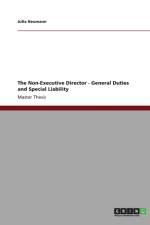von Julia Neumann
17,95 €
Master's Thesis from the year 2010 in the subject Law - Comparative Legal Systems, Comparative Law, grade: A-, University of Auckland (Law Faculty), course: Corporate Governance, language: English, abstract: This paper considers duties and liability of independent non-executive directors as authorities of advice and control in companies. It deals with the question of how non-executive directors should be made liable for mismanagement of the board, but primarily by, and particular failures of their own through breach of duty.Rather than engaging in the debate about non-executive directors¿ function and their efficiency for a business enterprise, the essay takes the latter as a given. Instead, it neutrally provides an outline of non-executive directors agreed functions, preferred skills and favoured qualities. The paper, moreover, details on the different duties deriving from common law principles, equity, and case law. It also considers on statutories and codes as well as contractual provisions providing equivalent regulations on directors¿ duties. This is to draw a complete picture of non-executive directors¿ role in a company and to classify where liability can result from. Furthermore, non-executive directors¿ liability is analysed. The focus, hereby, lies on the determination of directors¿ negligence. The issue is considered as to whether a court applies a different degree of negligence on non-executive directors than on executive directors. In this context, the influence of contractual provisions is contemplated. In addition, liability of non-executive directors is also compared to the liability of supervisory board members. Subsequently, alternative mechanisms of equalizing the risk of liability, such as indemnifications, insurances, and adequate reimbursements, are examined more closely. Concluding on non-executive directors¿ liability, the paper declares the loss of reputation and further ¿soft¿ sanctions as the actual sanction on non-executive directors.









